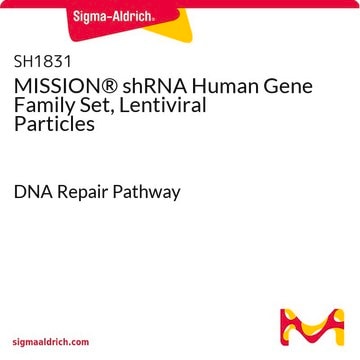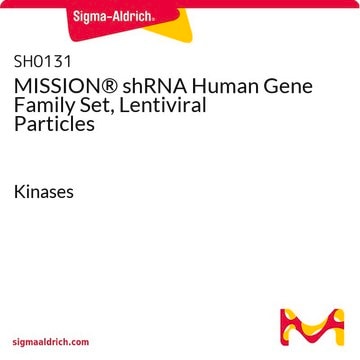SH1011
MISSION® shRNA Human Gene Family Set, Bacterial Glycerol Stock
Ion Channels
Iniciar sesiónpara Ver la Fijación de precios por contrato y de la organización
About This Item
UNSPSC Code:
41106609
NACRES:
NA.51
Productos recomendados
product line
MISSION®
storage temp.
−70°C
Gene Information
¿Está buscando productos similares? Visita Guía de comparación de productos
General description
The clones are sequenced-verified shRNA lentiviral plasmids (pLKO.1-puro) provided as 50 μl bacterial glycerol stocks (Terrific Broth, carbenicillin at 100 μg/ml and 15% glycerol). The set comes in 96-well plates that are barcoded for simple identification. A CD containing RefSeq, gene description, gene symbol, clone ID, hairpin sequence, locus link, and plate map positions are provided with the gene family set.
Other Notes
Each MISSION shRNA clone is constructed within the lentivirus plasmid vector, pLKO.1-Puro, followed by transformation into Escherichia coli. The pLKO.1-Puro vector contains bacterial (ampicillin) and mammalian (puromycin) antibiotic resistance genes for selection of inserts in either bacterial or mammalian cell lines. Each clone set consists of an average of 3-5 constructs that have been designed against each target gene using a proprietary algorithm. Therefore, a range of knockdown efficiency, with at least one construct from each gene set being >70%, can be expected when using these clones. This allows one to examine the effect of loss of gene function over a large series of gene knockdown efficiencies. Each shRNA construct has been cloned and sequence verified to ensure a match to the target gene.
For a detailed listing of other available gene family sets, visit the gene family set website.
Number of Genes: 278, Number of Clones: 1456
The exact gene and clone count at time of purchase may vary slightly as the TRC library is continually updated.
Legal Information
Use of this product is subject to one or more license agreements. For details, please see http://sigmaaldrich.com/missionlicense .
MISSION is a registered trademark of Merck KGaA, Darmstadt, Germany
Storage Class
10 - Combustible liquids
wgk_germany
WGK 3
flash_point_f
Not applicable
flash_point_c
Not applicable
Certificados de análisis (COA)
Busque Certificados de análisis (COA) introduciendo el número de lote del producto. Los números de lote se encuentran en la etiqueta del producto después de las palabras «Lot» o «Batch»
¿Ya tiene este producto?
Encuentre la documentación para los productos que ha comprado recientemente en la Biblioteca de documentos.
Nuria Sánchez-Bastardo et al.
Bioresource technology, 238, 379-388 (2017-04-30)
The hydrolysis process of a real fraction of arabinoxylans derived from wheat bran was studied. The influence of catalyst type and loading, reaction time and different metal cations were discussed in terms of the hydrolysis yield of arabinose and xylose
Nuria Sánchez-Bastardo et al.
Carbohydrate polymers, 160, 143-152 (2017-01-25)
The extraction/hydrolysis process of arabinoxylans from destarched wheat bran was studied in this work using different mesoporous silica supports and the corresponding RuCl
Declan A Doyle
Molecular membrane biology, 21(4), 221-225 (2004-09-17)
Water is probably the most important molecule in biology. It solvates molecules, all biochemical reactions occur in it and it is a major driving force in protein folding. Phospholipid membranes separate different water environments, but connections do exist between the
Stephen C Cannon
Neurotherapeutics : the journal of the American Society for Experimental NeuroTherapeutics, 4(2), 174-183 (2007-03-31)
The ion channelopathies are a diverse array of human disorders caused by mutations in genes coding for ion channels. More than 40 different channelopathies have been identified, with representative disorders from every major class of ion channel and affecting all
Sheila A Stewart et al.
RNA (New York, N.Y.), 9(4), 493-501 (2003-03-22)
Genome-wide genetic approaches have proven useful for examining pathways of biological significance in model organisms such as Saccharomyces cerevisiae, Drosophila melanogastor, and Caenorhabditis elegans, but similar techniques have proven difficult to apply to mammalian systems. Although manipulation of the murine
Nuestro equipo de científicos tiene experiencia en todas las áreas de investigación: Ciencias de la vida, Ciencia de los materiales, Síntesis química, Cromatografía, Analítica y muchas otras.
Póngase en contacto con el Servicio técnico








